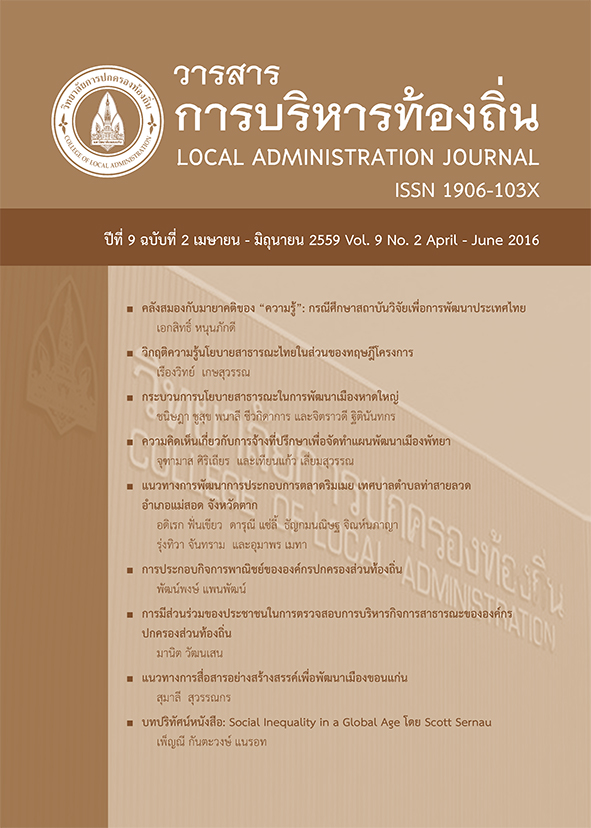วิกฤติความรู้นโยบายสาธารณะไทยในส่วนของทฤษฎีโครงการ (The Knowledge Crisis of Thailand’s Public Policy in Relation to Program Theory)
Keywords:
ทฤษฎีโครงการ, นโยบายที่มีทฤษฎีรองรับ, Program theory, Theory-based policyAbstract
นโยบายสาธารณะเป็นแนวคิดที่เกิดขึ้นมาเพื่อนำความรู้ทางสังคมศาสตร์ไปรับใช้สังคม ส่วนทฤษฎีโครงการ (Program Theory) เป็นตัวแบบที่แสดงให้เห็นถึงบทบาทของโครงการต่อการแก้ไขปัญหา และสร้างผลการเปลี่ยนแปลงให้เกิดขึ้นแก่สังคม ทฤษฎีโครงการจึงเป็นพื้นฐานที่ทำให้เกิดการพัฒนา เกิดการกำหนดและจัดลำดับความสำคัญของคำถามวิจัยประเมินผล และตอบคำถามวิจัยประเมินผล องค์ความรู้ที่พัฒนาจากทฤษฎีโครงการจึงจำเป็นต่อการจัดทำโครงการต่อไปในอนาคต หากทฤษฎีโครงการได้รับการสะสมมากเข้า ก็จะกลายเป็นที่มาของกรอบแนวคิดในการดำเนินนโยบายและโครงการในยุคหลัง ดังองค์ความรู้ที่สังคมตะวันตกสรุปไว้ในประเทศไทย ทั้งที่มีแผนพัฒนาสังคม และมีนโยบายในการแก้ปัญหาความยากจนมาอย่างยาวนานร่วม 50 ปี แต่ความรู้เรื่องทฤษฎี โครงการของไทยเราเองกลับพัฒนาไปไม่มาก ดังตัวอย่าง ความล้มเหลวของนโยบาย SML ในสมัยของรัฐบาล พันตำรวจโท ทักษิณ ชินวัตร ซึ่งต่อมาเปลี่ยนชื่อและเปลี่ยนรูปไปในสมัยรัฐบาลพลเอกสุรยุทธ์ จุลานนท์ การขาดองค์ความรู้เช่นนี้ทำให้การดำเนินนโยบายเป็นไปอย่างสับสน และถูกกำหนดโดยผลประโยชน์ทางการเมืองเพียงด้านเดียว ซึ่งไม่ใช่เฉพาะแต่นโยบาย SML ที่ยกตัวอย่างเท่านั้น แต่ยังครอบคลุมถึงการดำเนินนโยบายสังคมทั้งหมดของไทย การบริหารนโยบายสาธารณะไทยในปัจจุบันจึงตกอยู่ภายใต้สภาวะวิกฤติ 5 ประการ ได้แก่ 1) การขาดกรอบแนวคิดโครงการที่เพียงพอ 2) การนำโครงการไปปฏิบัติที่ไม่ถูกต้อง 3) การประเมินผลโครงการที่ไม่ตอบสนองต่อความต้องการใช้ประโยชน์ 4) ความสัมพันธ์ที่ไม่พึงปรารถนาระหว่างผู้มีส่วนได้เสียกับนักประเมินผล และ 5) การขาดแคลนการสะสมความรู้และภูมิปัญญาเกี่ยวกับการแก้ปัญหาสังคม บทความนี้ได้ตั้งคำถามที่น่าคิดต่อไปว่า การพัฒนาทฤษฎีโครงการของไทยควรเป็นบทบาทของใคร และทำไมประเทศไทยจึงยังไม่พัฒนาในเรื่องนี้
The Knowledge Crisis of Thailand’s Public Policy in Relation to Program Theory
Public policy is a concept that emerged out of a need for knowledge about social issues that will benefit the society as a whole, whereas program theory is a model for problem solving and guided social transformation. Program theory is, therefore, a foundation for theory development, problem identification, and prioritization of evaluative questions and answers. Knowledge related to social issues derived from program theory is indispensable for future program planning. The knowledge accumulated through program theory will serve as a conceptual framework for future policy formation, as normally is the case with Western societies.
In Thailand, with numerous attempted social development plans and poverty eradication policies throughout the past 50 years, the knowledge on program theory has still been weak. As an example, we have failed the SML policies during the Thaksin Shinawatra administration, which later were modified and experienced similar failure during the government of General Surayud Chulanont. Because of this incomplete knowledge on program theory, past policies were not professionally implemented and largely were guided by political interests. Consequently, Thailand is now faced with five public policy crises: 1) unclear program conceptualization; 2) poor program implementation; 3) minimal use of program evaluation results; 4) unfriendly relationships between the stakeholders and program evaluators; and 5) a dearth of cumulative knowledge about solutions for these social problems. In the final analysis, this article raises two important questions. First, who should be the main players in theory refinement? Second, and more importantly, why are Thai scholars not able to advance program theory?
Downloads
Published
How to Cite
Issue
Section
License
The copyright of all articles published in the Local Administration Journalis owned by the College of Local Administration, Khon Kaen University.



